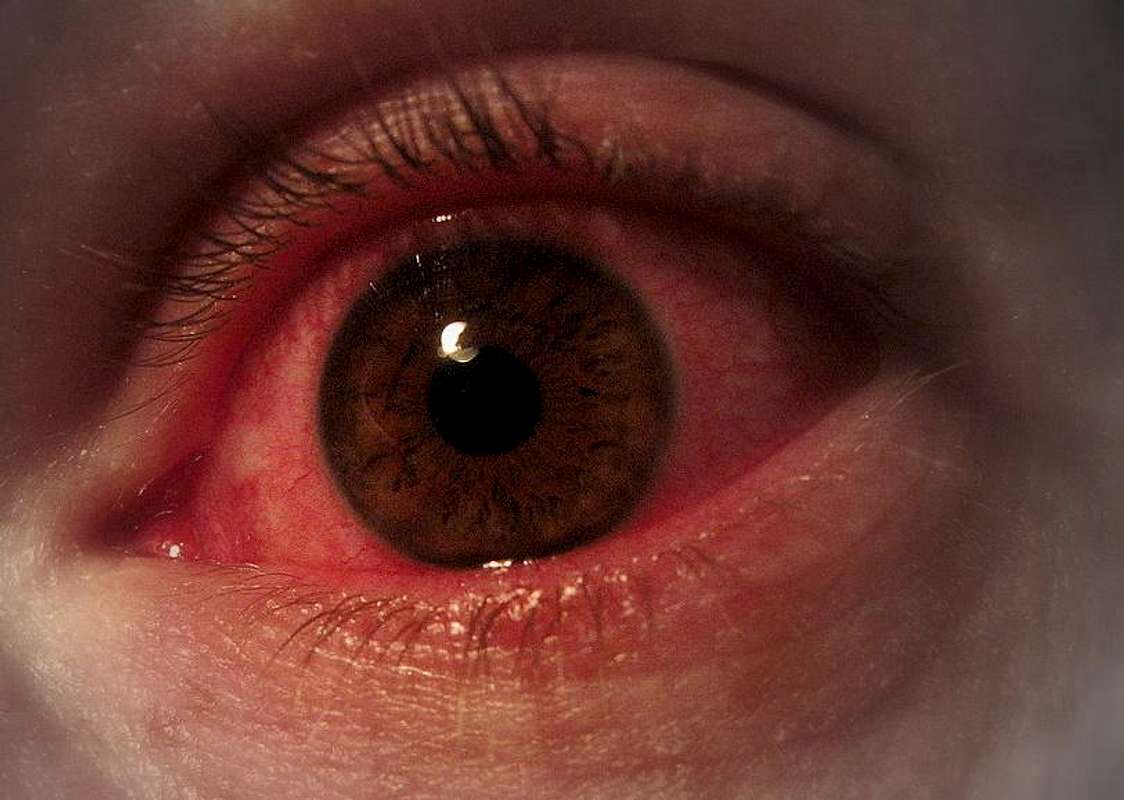Summertime and warmer weather is almost upon us. That means lots and lots of sunshine! Most of us are really good at putting on SPF so that our skin won't get sunburned. We forget about putting on sun protection for our eyes. Thus from the front of the eye to the back of the eye, UV exposure can cause damage over a lifetime that can have dire consequences.
 |
| An "eye sunburn" (aka Solar Keratopathy or Solar Keratoconjunctivitis) |
Just like your skin can get sunburned, the front of your eyes, (your cornea and conjunctiva) can as well. This can lead to red eyes that feel gritty, burn, and is accompanied by blurry vision. If this happens to you, your eye doctor can prescribe eye drops to aid in your comfort and improve your vision.
Our natural lens is designed to absorb UV light so as to protect our retinas. The result of this absorption is clouding of the lens, also known as a cataract. Just like UV light ages and damages your skin, it also ages your eyes. I tell my patients, “Cataracts are sort of like getting wrinkles.” Consider this: Two people, exactly the same age with similar health histories live many years. One person lives most of their life indoors. The other spends most of their life outdoors. Both are going to get wrinkles because they are aging. However, the person that spent most of their time indoors is going to have much less wrinkles than the person who spent lots of time outside. The most common type of cataract is called "nuclear sclerosis". This is where the lens yellows. Most individuals over the age of 50 have nuclear sclerosis to some degree. It's thought that a lifetime of UV exposure precipitates their development. Cataracts eventually progress until vision is affected and they must be surgically removed.
| The yellowing of the lens in a Nuclear Sclerosis Cataract. |
The back of your eye can suffer damage from light as well. As a child, did you ever use a magnifying glass to burn a leaf outside in the sunshine? Just like this magnifying glass, your eye is a system set up to have a focal point on your retina. While outside without sunglasses on, the cornea and lens are focusing light onto the retina just like the magnifying glass is focusing rays on the leaf. Thankfully, the cornea and lens bear the burden of absorbing most UV light and thus protects the retina from most of this damage. However, high frequency blue light is not absorbed by these structures and can still be damaging to the retina. The lack of sun protection in this scenario can aid in the development of retinal conditions like age-related macular degeneration.
Now you know that you need to wear sunglasses to protect your eyes. Are all sunglasses created equal? The answer to that is a resounding, “No”. Wearing sunglasses that lack UV protection is like wearing sheer fabric and hoping not to get sunburned. When you buy your sunglasses make sure they have a sticker on them that says "100% UVA and UVB protected". Polarized sunglasses work even better. Polarization actually cuts out all horizontal light from entering the eye. This takes away lots of glare, which allows fishermen to see fish in the water and eliminates glare from sunshine hitting the rooftops of cars for drivers.
Protecting your eyes from UV exposure may be as simple as making a fashion statement. At Visual Eyes Optometric, we offer sunglasses in many styles, from many designers, and both with prescribed and non-prescribed lenses. Put on a pair of sunglasses. You'll look really good...and you'll look really smart. Visit our office in Fairvew near Asheville, NC. We want to be your eye doctor. :-)

